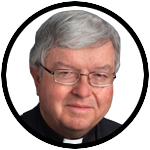
Father Kenneth Doyle
Q. I write to ask for guidelines on the Third Commandment — keeping holy the Lord’s day. I do not consider some of the things that I do to be work — cooking, for example, minor cleanups, mowing, trimming, weeding. Does the church look upon all chores as work? I find it very hard not to do some of the things that need to be done around the house.
I am thankful that God did give us this commandment, for I certainly do look upon Sunday as a day of rest — to spend with family when possible and to simply enjoy the day.
My husband (who is not a Catholic) is a business owner who can work from home. He is in a very challenging situation right now, without sufficient staff. On Sundays, he puts in a good six to eight hours of office work before he rests — otherwise the remainder of the week’s schedule would be overwhelming. (Chestertown, New York)
[hotblock]
A. I credit you for your sincere desire to set Sunday aside as a special day, which honors the fact that even the God of all creation rested on the Sabbath. You have captured the spirit of the Catechism of the Catholic Church that says, “Sunday is a time for reflection, silence, cultivation of the mind and meditation which furthers the growth of the Christian interior life” (No. 2186).
Basic household maintenance is exempted from the prohibition against “servile work” on that day; doing the dishes, preparing a meal and what you describe as “minor cleanups” are certainly permitted. A modest amount of gardening or lawn cultivation can be recreational and surely not “servile.” What the Sabbath command means to avoid is unnecessary shopping or heavy housekeeping that could be deferred.
Employment needs or economic circumstances may prevent one from observing the Sabbath rest, and this the catechism envisions and exempts. Your husband’s current challenge, in my mind, fits in here.
I would hope, though, that his circumstance will only be temporary; while I don’t know his religious history or principles, wisely does the catechism note, “The faithful should see to it that legitimate excuses do not lead to habits prejudicial to religion, family life and health” (No. 2185).
I might point out that, among American males, there can be a slavish addiction to Sunday televised sports, doing damage to the Sabbath goals of family time, reflection and rest.
And finally, nowhere does your question mention Sunday Mass, which must always be the central feature of a Catholic’s Sabbath observance. For 2,000 years, followers of Jesus have come together as a family of faith to celebrate the day of Christ’s resurrection and to be nourished by his body and blood.
Q. I am grateful for the work you do with your question-and-answer column. Your responses reflect both wisdom and patience. And this prompts me to ask the following: What are some of the things in today’s parish or church that you find exciting? Or, to put it another way, what are some changes that you have been happy to see over your years in the ministry? (Virginia Beach, Virginia)
A. Normally I would not choose to answer an open-ended question like this one. Readers, I believe, are more interested in factual answers than in my musings. But since I have just celebrated my 50th anniversary of ordination, I welcome this chance to share a few thoughts about those years.
Space constraints limit me to two developments that I view as great blessings in Catholic life. First is the broader involvement of laypeople in the work of the church.
When I was ordained a half-century ago, many parishes had two lay organizations: a rosary society, which consisted of several women who offered prayers for the parish and helped out with church decorations; and a Holy Name Society, men who would make a yearly retreat and sponsor an annual parish smoker.
In the parish from which I just retired, there are now more than 400 lay parishioners who help with the work of the church — lay catechists; lectors and extraordinary ministers of holy Communion; those who visit and take Communion to shut-ins, patients in hospitals and residents of nursing homes; men and women who staff a parish food pantry and host homeless families overnight in a parish facility, etc.
The other is the 2013 election of Francis as pope. As the editor of Time magazine put it, “He has not changed the words, but he’s changed the music.” Whereas many may have associated the church in the past with rules and prohibitions, some of those same people now link the church first of all with help to the poor, mercy and forgiveness.
***
Questions may be sent to Father Kenneth Doyle at askfatherdoyle@gmail.com and 40 Hopewell St. Albany, N.Y. 12208.
PREVIOUS: Don’t get used to evil — confront it with strength
NEXT: Readings of the holy Mass – Twenty-first Sunday in Ordinary Time


Happy Golden Jubilee, Father!!! I always enjoy reading your column. All the best in the future!